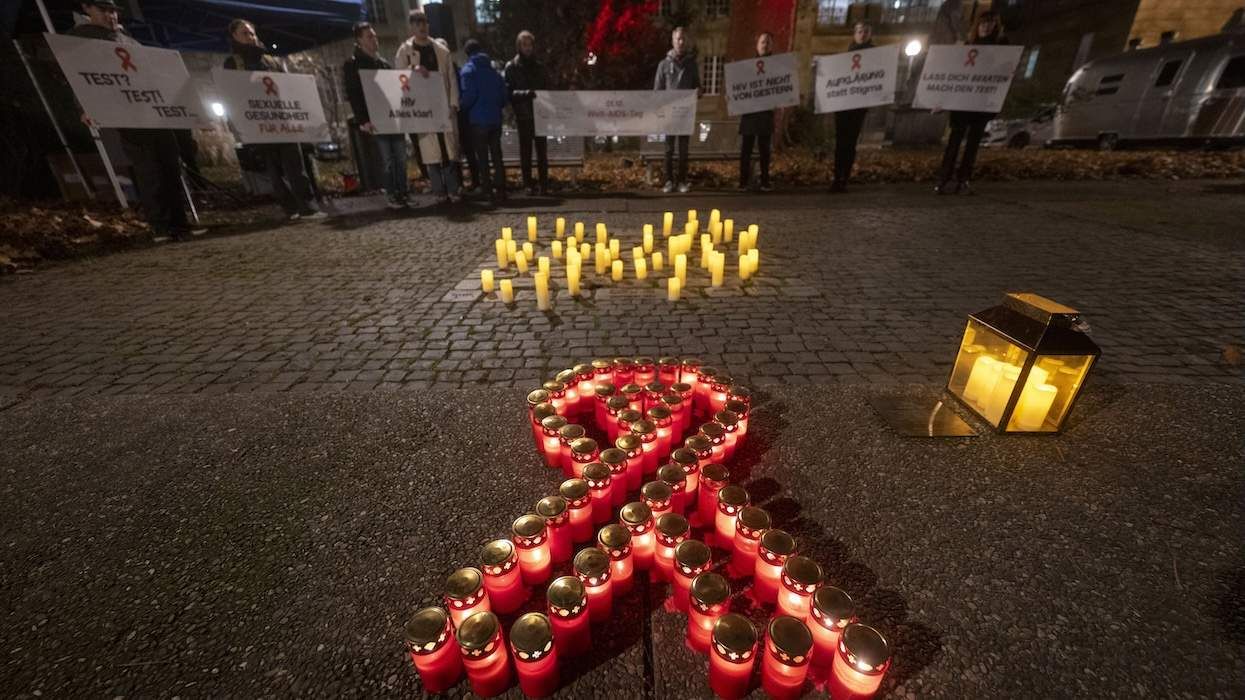
CONTACTAbout UsCAREER OPPORTUNITIESADVERTISE WITH USPRIVACY POLICYPRIVACY PREFERENCESTERMS OF USELEGAL NOTICE
© 2025 Equal Entertainment LLC.
All Rights reserved
All Rights reserved
By continuing to use our site, you agree to our Privacy Policy and Terms of Use.
We need your help
Your support makes The Advocate's original LGBTQ+ reporting possible. Become a member today to help us continue this work.
Your support makes The Advocate's original LGBTQ+ reporting possible. Become a member today to help us continue this work.
"Love, whatever its nature, can never be depraved except in the eyes of a cynic." -Mikhail Kuzmin, Wings
Russia's crackdown on queers is awful. I'm glad that boycotts have attracted attention, but beyond our purchasing power, let's not forget the power we've always had: to read, shape opinion, and drive culture. Lately I've been thinking about Russia's own queer history, and about one of its forgotten heroes. My hope is that you'll spend the dollars you've saved on vodka to pick up a book by Mikhail Kuzmin.
In 1928, at the invitation of students of the Russian Institute of Literature, Kuzmin gave the final public reading of his life. He assumed the event would be poorly attended; the once-great writer had been largely silenced and, he worried, forgotten. The reading was not advertised to the public and only students with tickets were allowed entrance. The director of the Institute feared that any reading by Kuzmin would attract a large contingent of homosexuals and thus the attention of the authorities.
The director was right in his fear. On the night of the reading there came a crush at the doors, the ticket system broke down, and gays crowded in among the students. Kuzmin's reading electrified the audience -- no surprise, as he read his poem The Trout Breaks the Ice, a staggering work swirling with autobiography and cultural allusions that is also an ode to the triumph of desire, a poem that maintains its electricity through translation and time. An ovation followed the reading and the gays pushed to the front, showering Kuzmin with flowers, bouquet upon bouquet landing at his feet. The director and student organizers quaked -- they knew they would be called before authorities to account for the scandal (they narrowly escaped punishment, pleading ignorance) -- but Kuzmin beamed.
Did he know this would be the last public reading of his life? The times had turned forcefully against him, and in the coming years his friends would be interrogated and the apartment he shared with his lover, Yury Yurkun, would be searched, their artwork and writing seized -- but that night he beamed. Did he know it would be, as one student attendee put it, "the last demonstration of Leningrad's homosexuals" for over half a century? (Kuzmin was lucky to die of natural causes in 1936; just two years later, Yurkun was rounded up with other gay artists and shot.) Certainly he had a sense of the ice of repression spreading and thickening, of the long winter to come, but here were his people -- like the beautiful tail of his trout -- lashing, thrusting, against that ice. He beamed.
 That you've probably never heard Kuzmin's name is testament to the Soviet regime's success in erasing gay contributions to the arts in Russia. For decades Kuzmin's archives were strictly off limits to Western scholars due to the "intimacy" of his diaries, which include delightful descriptions of St. Petersburg's gay and literary society in the Silver Age, from musings on poetic influence to bathhouse experiences (here's just a taste, from a bathhouse encounter dated Dec. 23, 1905: "I was in that kind of terribly stupid but not unpleasant situation, when you know that both of you know something, but are keeping silent. He stared straight at me, motionless, with a kind of mermaid look, not quite drunkenly, not quite insanely, almost terrifyingly, but when he began to wash me there was no room for doubt"). If literary history were more just, Kuzmin's diaries would be fully translated, published, and widely read, and his name would be as familiar to readers of The Advocate as Oscar Wilde, Andre Gide, or Gore Vidal.
That you've probably never heard Kuzmin's name is testament to the Soviet regime's success in erasing gay contributions to the arts in Russia. For decades Kuzmin's archives were strictly off limits to Western scholars due to the "intimacy" of his diaries, which include delightful descriptions of St. Petersburg's gay and literary society in the Silver Age, from musings on poetic influence to bathhouse experiences (here's just a taste, from a bathhouse encounter dated Dec. 23, 1905: "I was in that kind of terribly stupid but not unpleasant situation, when you know that both of you know something, but are keeping silent. He stared straight at me, motionless, with a kind of mermaid look, not quite drunkenly, not quite insanely, almost terrifyingly, but when he began to wash me there was no room for doubt"). If literary history were more just, Kuzmin's diaries would be fully translated, published, and widely read, and his name would be as familiar to readers of The Advocate as Oscar Wilde, Andre Gide, or Gore Vidal.What we do have available in English is an excellent, gripping biography, Mikhail Kuzmin: A Life in Art, by John Malmstad and Nikolay Bogomolov, as well as The Selected Prose & Poetry of Mikhail Kuzmin, edited and translated by Michael Green. The latter volume contains stories, plays, the poem cycle Alexandrian Songs, and the shattering poem previously mentioned, The Trout Breaks the Ice.
Also included in the selected works is a translation of Wings, Kuzmin's novel of homosexual awakening -- and here we arrive at the source of Kuzmin's notoriety in life and one of the reasons he deserves reading today. Wings is not only an aesthetically subversive work, it is a frank defense of homosexuality, in which the young protagonist confronts and accepts his desires with optimism and ultimately joy, likening this acceptance to growing wings. The novel was first published in 1906. Did you catch that date? 1906. In contrast to earlier works like Wilde's The Picture of Dorian Gray (1890) or Gide's The Immoralist (1902), the gay content in Wings isn't just hinted at or implied (Gore Vidal's The City and the Pillar is explicit, but wasn't published until 1948). The book was an overnight sensation.
Looking back over a century later, it is difficult to fathom Kuzmin's courage--he shocked the system. Nothing like Wings had ever been published; not in the West and not in Russia. As print runs sold out the book was immediately reissued. Also difficult to fathom is the relative ease with which gay artists were allowed to live their lives and envision their possibilities in prerevolutionary Russia. With the crumbling of the czarist empire, before Soviet repression took hold, we see a flowering of artistic daring and a measure of sexual freedom. But even so, Kuzmin's daring humbles this writer, and ought to inspire us all.
Wings is more than just historically important--the thing is good. Through a series of short fragments we follow Smurov, the orphaned young narrator, as he is introduced to a new way of life and the nature of his own desire. Unlike the dominant Russian style of the time, the narrative is not concerned with complex psychological investigation; the fragments are impressionistic. We enter a scene mid-conversation, stay for the juicy bits, and exit just as quickly. The cumulative effect is magnificent, modern, layered. The novel is structured in three parts: the first is set in cosmopolitan St. Petersburg; the second in a rural religious community (Kuzmin himself came from a family of Old Believers and remained interested in their cultural legacy his whole life); and the final section in Italy. There you have the crux of a conflict that continues today: a conflict between the inheritance of Old Russia--rich in tradition, yet deficient in tolerance--and the modernizing pull of Western culture.
The project of this novel--and of Kuzmin's life--was to affirm Russian culture and homosexuality together. He believed in the power of art to achieve this. All of his works are deeply queer, deeply Russian, and deeply relevant to us today.
Justin Torres's work has appeared in The New Yorker, Granta, Tin House, Glimmer Train, and other publications. His debut novel, We the Animals, was published in 2011.
From our Sponsors
Most Popular
Bizarre Epstein files reference to Trump, Putin, and oral sex with ‘Bubba’ draws scrutiny in Congress
November 14 2025 4:08 PM
True
Jeffrey Epstein’s brother says the ‘Bubba’ mentioned in Trump oral sex email is not Bill Clinton
November 16 2025 9:15 AM
True
Watch Now: Pride Today
Latest Stories
7 times Pete Hegseth was the definition of toxic masculinity
December 02 2025 5:46 PM
Man pleads guilty to murder of gay University of Mississippi student Jimmie 'Jay' Lee
December 02 2025 2:32 PM
Florida man partially paralyzed after neighbor allegedly shot him and used anti-LGBTQ+ slurs
December 02 2025 1:30 PM
Queer comedian Cameron Esposito has first baby with wife Katy Nishimoto
December 02 2025 12:49 PM
Trans National Guard employee in Illinois sues Trump over restroom ban
December 02 2025 11:59 AM
Oklahoma University instructor suspended for failing student’s unscientific anti-trans psychology essay
December 02 2025 11:03 AM
Here are all of Trump's political enemies that have been charged or investigated (so far)
December 02 2025 9:52 AM
Joe Biden to receive top honor at LGBTQ+ leadership conference for his contributions to equality
December 02 2025 6:00 AM
On World AIDS Day, thinking of progress and how to build on it in the face of hostility
December 01 2025 7:47 PM
Ex-Biden White House aide called out for implying Cory Booker’s new marriage is suspicious
December 01 2025 6:04 PM
True



































































Charlie Kirk DID say stoning gay people was the 'perfect law' — and these other heinous quotes